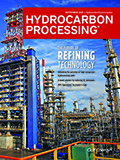
September 2021
Special Focus: Refining Technology
2020 can be viewed as one the most challenging periods in the history of the oil and gas sector.
Addressing climate change and environmental issues has become a top priority in the 21st century.
In response to challenges related to global warming, climate change and greenhouse gas emissions, numerous countries are adopting regulatory measures requiring industry to further improve energy efficiency.
Process engineers must continuously monitor the health and performance of process units.
Many refineries are experiencing new problems related to the formation of stable emulsions and poor separation due to the increased use of lower-cost opportunity crude oils that have a high total acid number (TAN), higher gravities and more sulfur content.
Catalysts
The global refining industry continues to move toward more restrictive environmental laws for sulfur oxide (SO<sub>x</sub>) emissions.
Driving innovation is an inescapable strategic reality, not only for accelerating new products development and technological solutions but also for creating new markets.
Process Optimization
LPG pool management is becoming more important as the regulations on the product specifications tighten.
Large-diameter piping used in the petrochemical, oil and gas, steel plant and power industries often carry toxic fluids and can pose significant safety hazards.
Plant performance depends on stable operations, with steady feed, product flow, temperature and pressure control as per process requirements.
Maintenance and Reliability
Corrosion under insulation (CUI) is a severe form of localized external corrosion that occurs on stainless steel (SS) that has been insulated.
Process Controls, Instrumentation and Automation
Competition in the ethylene market is fierce and demands for the quality of the ethylene are increasing. High-purity monomers are used to make polyethylene and polypropylene, the polymeric building blocks for two important plastics.
Columns
Since its inception in 1922, <i>Hydrocarbon Processing</i>—originally called <i>Petroleum Refiner</I> when first published—has focused on delivering the latest refining technologies to readers around the world.
Bearings are precision components; to survive, they require clean lubricants in adequate amounts.
Trends and Resources
In mid-August, <i>Hydrocarbon Processing</i> announced the finalists of the 2021 <i>HP</i> Awards, celebrating innovative technologies and people that have been instrumental in improving facility operations over the past year and are making the HPI safer, more efficient and more profitable.
Blockchain and distributed ledger technology have gained widespread media attention in recent years, with much of the spotlight falling on Bitcoin and other cryptocurrencies.
What are the latest advancements in HPI technologies? This month’s Innovations section details the tools and technologies that are optimizing plant operations.
The hydrocarbon processing industry (HPI) is constantly investing in new technologies to optimize operations.
Orbital Energy Group appoints The Honorable La Doris Harris as Chief Diversity Officer and CEO of Orbital Solar Services

- INEOS receives €300-million grant to rejuvenate and decarbonize its Lavera plant 2/19
- AGC Vinythai commissions expanded chlor-alkali plant and e-BiTAC electrolyzers from thyssenkrupp nucera 2/19
- BASF launches AdBlue GE (green electricity) to decarbonize mobility value chain 2/19
- Carbon Neutral Fuels select Johnson Matthey, bp and Honeywell UOP technologies for UK SAF plant 2/19
- ExxonMobil starts operations on second carbon capture project in Louisiana (U.S.) 2/19
- Pall introduces two new technologies to reduce CAPEX and TCO in oil and gas processing 2/19




